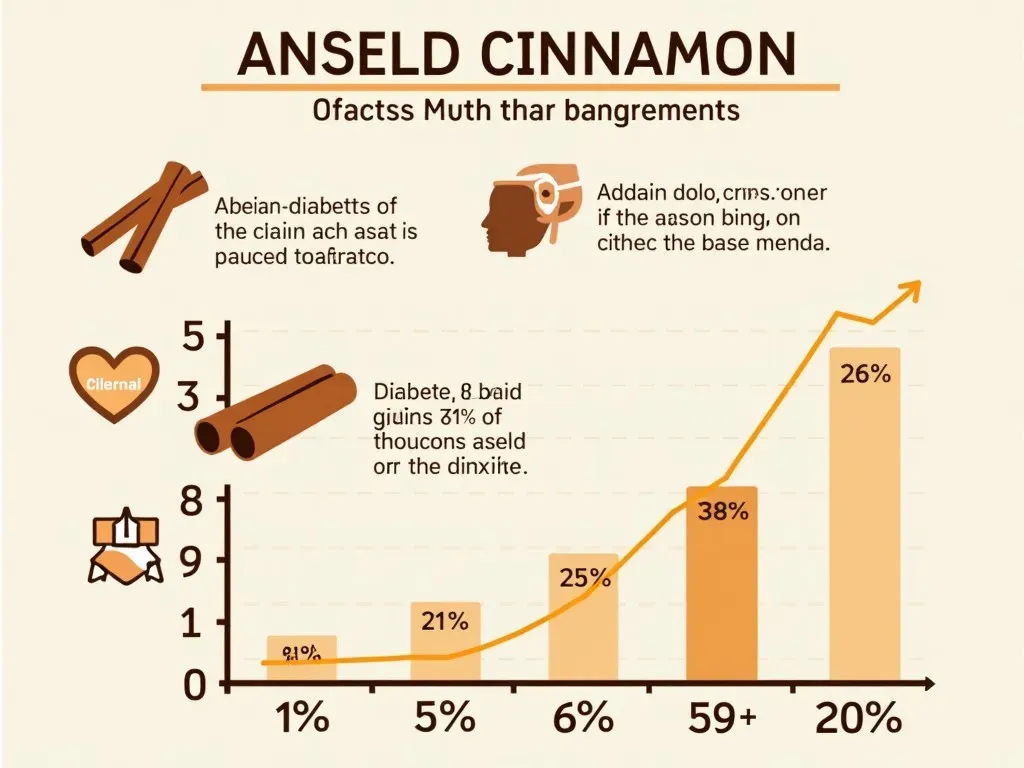Cinnamon For Diabetes has garnered attention in recent years, with various scholarly articles exploring its potential benefits. The spice, rich in antioxidants and bioactive components, is believed to have a role in managing blood glucose levels, improving insulin sensitivity, and reducing complications associated with diabetes.
The Mechanism Behind Cinnamon and Insulin Resistance
Cinnamon’s active components, such as cinnamaldehyde, have been studied for their insulin-mimetic properties. They are thought to enhance glucose metabolism by improving insulin sensitivity and mimicking insulin actions. This could potentially be beneficial for individuals managing insulin resistance, a precursor to type 2 diabetes.
Scientific Insights on Cinnamon for Diabetes
Numerous studies have attempted to quantify the impact of cinnamon on diabetes management. Below is a summary of some critical findings:
| Study Title | Findings | URL |
|---|---|---|
| Cinnamon Use in Type 2 Diabetes: An Updated Systematic Review and Meta-Analysis | The study evaluated multiple randomized controlled trials (RCTs), indicating some positive glycemic-lowering effects but with varying outcomes across different trials. | Read More |
| Cinnamon Improves Glucose and Lipids of People With Type 2 Diabetes | A study involving 60 participants showed improvements in blood glucose and lipid levels after cinnamon supplementation. | Read More |
| Safety of Cinnamon: An Umbrella Review of Meta-Analyses and Systematic Reviews | Evaluated the safety and effectiveness of cinnamon for managing diabetes, compiling evidence from multiple studies. | Read More |
| Efficacy and safety of cinnamon in type 2 diabetes mellitus and pre-diabetes | This study synthesized evidence on cinnamon’s efficacy in diabetic management, shedding light on its therapeutic potential. | Read More |

Cinnamon Varieties and Their Effects
Not all cinnamon is created equal. The two primary types—Ceylon and Cassia—differ significantly in terms of their active components:
-
Ceylon Cinnamon: Often labeled as "true cinnamon," it contains lower levels of coumarin, a compound that may be harmful in larger doses. This type may be more beneficial for long-term health, especially for individuals with diabetes.
-
Cassia Cinnamon: More common and less expensive, it usually has higher coumarin levels. While it may provide some health benefits, excessive consumption could pose risk factors for liver damage.
| Type of Cinnamon | Coumarin Content (mg/100g) |
|---|---|
| Ceylon | Low (0.0004 – 0.02) |
| Cassia | High (5 – 30) |
Studies on Cinnamon and Its Effectiveness in Diabetes Management
-
Glycemic Control: Research shows that cinnamon can potentially lower fasting blood glucose levels. A 2019 meta-analysis demonstrated that cinnamon supplementation could significantly reduce HbA1c levels, an essential marker for diabetes management.
-
Lipid Profiles: In addition to its effects on blood glucose, cinnamon also influences lipid profiles. Studies report improvements in levels of LDL (bad cholesterol) and triglycerides among participants consuming cinnamon regularly.

- Bone Density and Insulin Sensitivity: Conducted on animal models, studies reveal that cinnamon may promote bone density while also serving as a potentiating agent for insulin sensitivity—offering a dual benefit for diabetes sufferers.
Possible Side Effects and Considerations
Despite the potential benefits, it’s crucial to approach cinnamon consumption thoughtfully. Some individuals may experience allergic reactions or gastrointestinal discomfort.
Recommended Dosage
Most studies suggest a daily intake of 1 to 6 grams (approximately half a teaspoon to two teaspoons) of cinnamon. However, it’s always wise to consult with a healthcare professional before incorporating significant amounts into your diet.
Frequently Asked Questions (FAQs)
1. How does cinnamon help with insulin resistance?
Cinnamon potentially enhances insulin sensitivity and mimics insulin actions, making glucose uptake by cells more efficient.
2. Are there any significant risks associated with consuming cinnamon?
While generally safe in culinary amounts, excessive intake—especially of Cassia cinnamon—can lead to toxicity due to high coumarin levels.
3. What forms of cinnamon are the most effective?
Ceylon cinnamon is often preferred due to its lower coumarin content and potentially more beneficial effects for long-term consumption.
4. Can cinnamon replace diabetes medication?
Cinnamon should not be seen as a replacement for prescribed medication but rather a complementary approach. Always consult with healthcare professionals before making changes to your treatment plan.
5. How should cinnamon be consumed for maximum benefit?
Cinnamon can be added to foods like oatmeal, smoothies, or tea. Some people also opt for Cinnamon Supplements but should do so under medical advice.
6. Is there scientific evidence backing up cinnamon’s benefits for diabetes?
Yes, numerous studies documented in scholarly articles support the potential benefits of cinnamon for blood glucose and lipid management in type 2 diabetes.

In summary, ongoing research continues to explore cinnamon’s full potential in diabetes management. Through careful consumption and alongside conventional treatment strategies, cinnamon might offer an exciting addition to the dietary plans of those living with diabetes.
